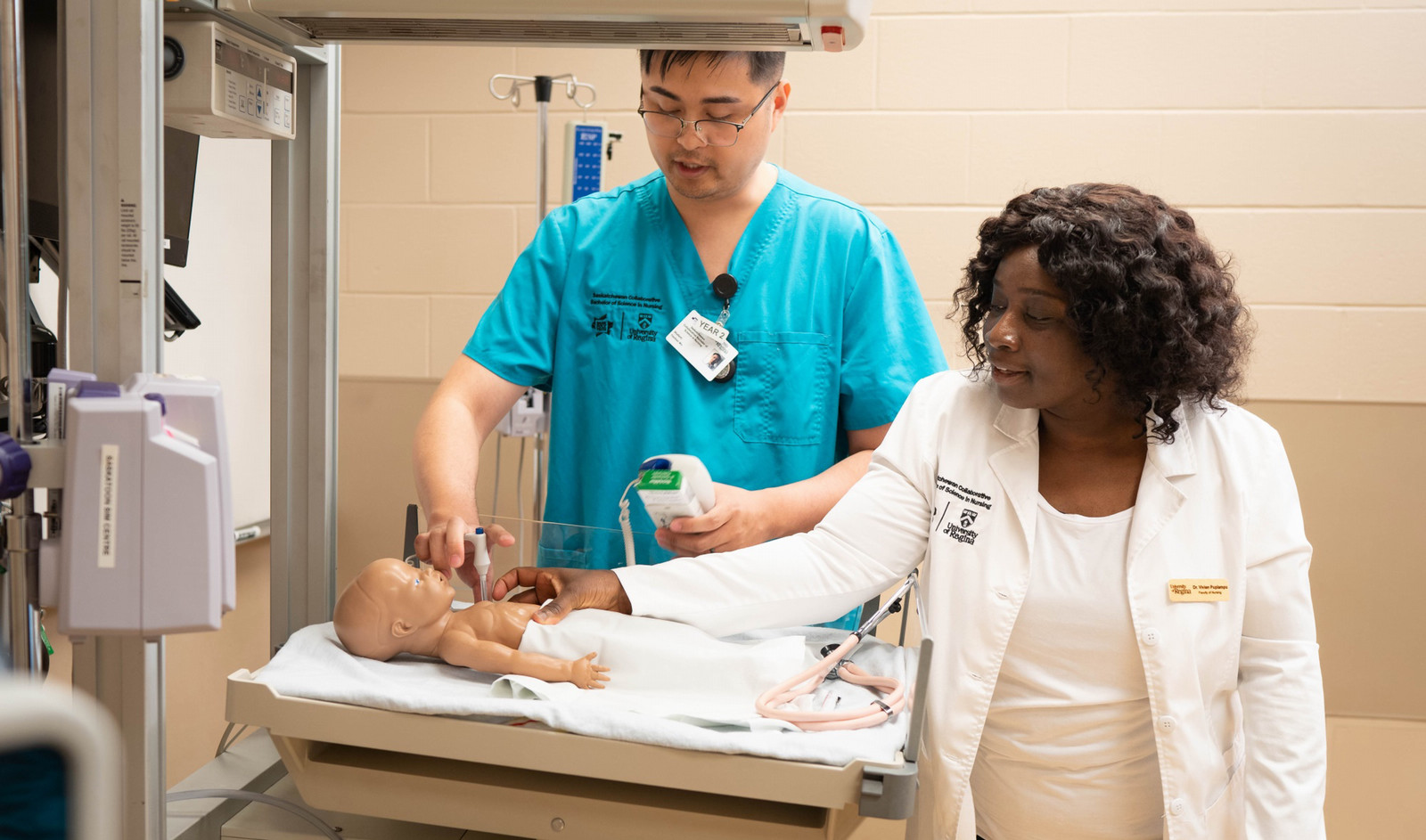
Master of Nursing – Nurse Practitioner (CNPP)
The Collaborative Nurse Practitioner Program (CNPP) is an online graduate-level theory and practice program offered through a partnership between the University of Regina and Saskatchewan Polytechnic.
A Nurse Practitioner (NP) has the authority to perform advanced health assessments, diagnose health problems, order diagnostic tests and prescribe medications. A Nurse Practitioner manages all aspects of care from the point of entry to the health care system, through to the community where they reside, participating in health community policy development, health promotion and illness prevention. Primary care Nurse Practitioners provide care to patients across the lifespan.
The Collaborative Nurse Practitioner program enables registered nurses to pursue specialized education in their home community for the theory portion of the program. This includes online student and faculty-led web conference discussions. Later in the program, students complete a clinical placement either in or outside their home community.
Upon completing this program, graduates are qualified to write the Canadian Nurse Practitioner exam which they must pass to obtain registration as a Registered Nurse (Nurse Practitioner).
This program is accredited by the College of Registered Nurses of Saskatchewan (CRNS) which acknowledges that graduates will be eligible for RN(NP) licensure in Saskatchewan after successful completion of the Canadian Nurse Practitioner exam. The program has also received accreditation from the Canadian Association of Schools of Nursing (CASN).
There are both full-time and part-time study options.Quick Facts
Connect with us
Nurse Practitioner Meet Your Faculty
Why Study Nursing at the University of Regina?
Clinical Practicum
To complete the program, 702 clinical practical education hours are completed with qualified Nurse Practitioner preceptors in approved sites either in or outside your home community.Flexibility
This research- and practice-based program includes 11 courses, each offered online asynchronously and completed over 13 weeks. The asynchronous nature of our courses is very popular with students.One-week residency
There is a one-week residency requirement in Regina during the second semester of studies (winter term, year 1). The residency week allows you to meet other students and faculty in person and experience high fidelity simulation learning.Expert professors and instructors
The program is delivered by PhD-qualified nurse leaders and nurse practitioners. Our faculty members have received national and international recognition.Collaborative Nurse Practitioner Program Frequently Asked Questions
Applicants must meet the entrance requirements of the Faculty of Graduate Studies and Research and be licensed to practice as a Registered Nurse in a Canadian province or territory. In addition, you must:
- Have an overall grade point average of 75 per cent or more in the last 60 credit hours of your most recent post-secondary studies
- Demonstrate completion of an approved bachelor’s degree in nursing
- Indicate the Canadian province(s) or territory where you are licensed as a Registered Nurse
- Provide a CV/resume and cover letter and three references.
MNUR 800 Foundations for Advanced Practice Nursing
The course reviews the domains of advanced practice nurse roles in Canada. An examination of the historical, philosophical, sociopolitical and economic influences develops the foundation for practice. Factors that affect role implementation and innovative models that utilize the advanced practice nurse role in primary health care are investigated.
MNUR 801 Research for Nurse Practitioners
Evidence informed methods used in clinical practice by advanced practice nurses are examined. Critically appraise and apply research, best practice guidelines and theory relevant to advanced nursing practice. Students will develop a research question addressing an identified gap related to advanced practice nursing.
MNUR 802 Advanced Health Assessment and Diagnostic Reasoning
Phases of clinical judgment and various diagnostic reasoning models are explored in the context of direct patient care. Health maintenance concepts and diagnostic reasoning skills are developed. The mandatory one-week on-campus residency is designed to develop and evaluate health assessment and diagnostic reasoning skills
MNUR 807 Health and Illness Across the Lifespan II
A broad knowledge base is integrated with critical appraisal for determining diagnoses and patient needs. Appropriate selection from a range of evidence-informed nonpharmacological and pharmacological interventions restores or maintains functional, physiological and mental stability to achieve optimal health. Gender and episodic care are emphasized.
Yes! Once you have been accepted as a fully-qualified graduate student with no conditions or holds on your admission, then you are eligible to apply for our scholarships, awards, or graduate teaching assistant positions.
Nursing Scholarships and Awards
- Saskatchewan Gerontology Association Bursary
Apply for this scholarship by visiting our Graduate Awards Portal (GAP), the U of R online graduate scholarship application system.
Other Nursing Scholarships
- F.A. Davis Nursing Graduate Scholarship
- Saskatchewan Nurses Foundation
- Canadian Nurses Foundation
- Government of Saskatchewan Bursary Program
- Canada Student Loan Forgiveness Program for Family Doctors and Nurses
- Loan Forgiveness Program for Nurses and Nurse Practitioners
Saskatchewan Polytechnic also offers scholarships.
All Graduate Funding Opportunities
Visit our Faculty of Graduate Studies and Research website to learn about all graduate funding opportunities including:
- National Scholarships (including Tri Council funding)
- FGSR Funding/Special Awards
- Funding for Indigenous Students
- Funding for International Students
- Other Awards and Scholarships
- External Scholarship Opportunities
- External Student and Faculty Awards
What Can You Do With a Nurse Practitioner Master’s Degree?
Nurse Practitioners are an integral part of the health care system providing care in community settings such as primary care clinics, nursing stations, long term care facilities and in health care teams. Our Nurse Practitioners are sought after across Canada to provide primary care.
Saskatchewan Nurse Practitioners are employed by the Saskatchewan Health Authority, or they set up independent practices.
Some of the jobs our graduates go on to include:- Nurse Practitioner
- Primary Care Nurse Practitioner
- Emergency Nurse Practitioner
- Women's Health Nurse Practitioner
- Oncology Nurse Practitioner
- Pediatric Nurse Practitioner
